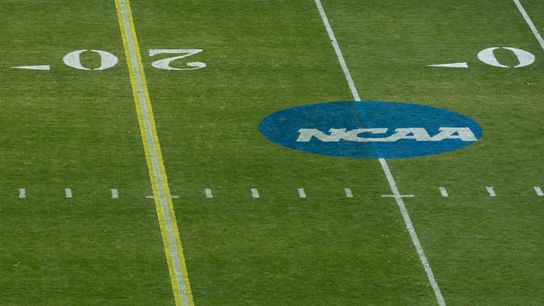SB Nation's Steven Godfrey has an extensive expose out today on Mississippi State linebacker Leo Lewis's role in the NCAA's ongoing investigation into Ole Miss. It's an interesting look at how the NCAA is plunging into uncharted territory by building a case against a school through the testimony of a rival player.
And that's a key point here, because the NCAA is using Lewis's testimony as a cornerstone -- heck, the cornerstone -- for its case around Ole Miss, at least Hugh Freeze-era Ole Miss. Lewis has already testified for the NCAA three times, and the NCAA wants to bring him to Kentucky next month, five days before Lewis and Mississippi State are set to face LSU, to testify for a fourth time.
(To be clear, not everyone views Lewis's testimony in the same light as SB Nation.)
The NCAA has been able to wring so much juice out of Lewis through providing him with limited immunity -- which exempts Lewis from any possible punishment for past violations so long as he tells the truth, the whole truth and nothing but the truth. The NCAA took great pains to establish that before each of Lewis's three testimonies, as Godfrey outlines:
“Leo, do you understand that the limited immunity offer is contingent on you doing that, providing complete and truthful information?” NCAA investigator Mike Sheridan asked Lewis, reading from a prepared document.
“Yes sir,” Lewis replied.
Now officially on the record that August, Sheridan asked if Lewis understood that immunity would only cover past events, not any potential future violations, and that if he was found to have provided false or misleading information, he could still lose his grant.
“Yes sir,” Lewis replied.
Finally, Lewis’ lawyer, John Brady, stepped in to clarify how far his client could go.
“I just want to make sure we’re clear that the immunity extends to everything that you may ask Leo today, is that correct?” Brady asked.
“That is correct,” Sheridan replied.
The NCAA has, obviously, focused its investigation on the extracurricular benefits Ole Miss provided to Lewis throughout this recruitment -- free hotel stays, free meals, free Rebels gear and lots and lots of cash. But Lewis's testimony also established that Ole Miss was not the only program recruiting Lewis, and not the only program willing to step beyond the rulebook in an effort to secure Lewis's services.
In addition, an audio tape of an alleged conversation between Farrar and Lewis’ mother, Tina Henderson, was submitted by Farrar’s counsel after the November interview. In the audio tape, recorded on Feb. 2, 2015, a day before Lewis says Allen paid him $10,000 to sign with Ole Miss, Henderson allegedly told Farrar that she had received multiple cash offers for Lewis, including $650,000 from LSU and $80,000 from Mississippi State.
As it happens, the article mentions who recruited Lewis for each of those programs.
According to documents obtained by SB Nation, Lewis spoke about the four schools he was primarily recruited by and the coaches and staffers he met: Ole Miss (Farrar and Tom Allen, now head coach of Indiana), LSU (Frank Wilson, now head coach of UTSA), Mississippi State (Tony Hughes, now head coach of Jackson State) and Alabama (Burton Burns).
Farrar is no longer in college sports, but each of the others mentioned in that passage still is. Tom Allen is now the head coach at Indiana, Frank Wilson is now the head coach at UTSA and Tony Hughes is now the head coach at Jackson State. (Burns is still in his position as Alabama's running backs coach; nowhere in the piece is it alleged that Alabama offered cash or other benefits to Lewis.)
So here you have the mother of a player that the NCAA deems credible saying on tape that schools beyond just Ole Miss offered Lewis money, and three of the coaches involved in the recruitment are now head coaches at Division I universities.
This, naturally, leads to the question on if the NCAA is pursuing this and if not, why? One possible explanation is that the NCAA has all its eggs in the Ole Miss basket and simply doesn't have the resources to expand the investigation elsewhere. Lewis was granted immunity for any violations he committed throughout his recruitment -- as long as he was sufficiently truthful -- so does that mean those schools were granted retroactive immunity as well?
Doesn't the NCAA have to investigate those claims? Especially if they involve head coaches at three of its Division I institutions?
The larger 5- and 6-figure claims came into the case from Lewis's mother as evidence from Barney Farrar's lawyer, so it's possible the NCAA doesn't deem Lewis's mother credible. The only programs Lewis admitted to receiving cash from were Ole Miss and Mississippi State, and it's possible the NCAA-granted immunity covered those obvious violations for Mississippi State. Or it's possible the NCAA will penalize Mississippi State (and LSU) after it's done with Ole Miss.
We can't know for sure, though, because the NCAA doesn't talk about these things. "Due to rules put in place by our members, we cannot comment on current, pending or potential investigations," an NCAA spokeswoman told FootballScoop.
We've reached out to Indiana, UTSA, Jackson State, LSU and Mississippi State for their reactions to the allegations. UTSA has declined comment; each of the other programs has yet to respond as of press time. We'll let you know if that changes.
